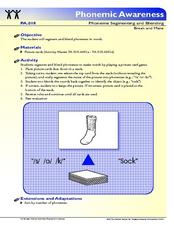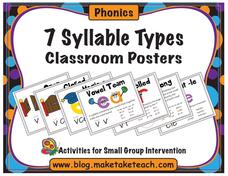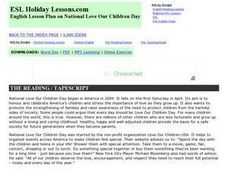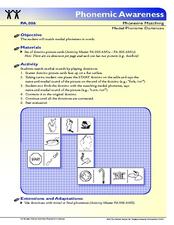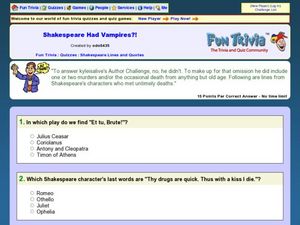Curated OER
Learning About Fiction Genres in the Elementary School Library
Teaching about fiction genres can be challenging. The lesson here, designed for library media specialists, offers a fun way to do it. In the lesson, learners visit the library and learn about the different types of fiction through book...
Curated OER
Hanukkah - ESL
Reinforce vocabulary and reading comprehension with a Hanukkah-themed collection of worksheets. Scholars first read a two-paragraph informational text, then apply their new-found-knowledge to match phrases, fill in blanks with...
British Council
William Shakespeare
After watching a three-minute video detailing the life of William Shakespeare, scholars take part in several activities designed to show what they know about the famous writer. Learners read a series of eight sentences and put them in...
K12 Reader
What is an Appositive?
Appositives, those tricky little words and phrases that provide more information about nouns, are the subject of a series of worksheets linked to this resource.
Florida Center for Reading Research
Phonemic Awareness: Phoneme Segmenting and Blending, Break and Make
Young learners build phonemic awareness and strong phoneme blending skills. Pairs guess the image on the card based on the word segment sounds given by blending what they hear.
Curated OER
Introduce /m/
Start by drawing a large letter m on the board for scholars to see. Do they know what letter this is? Once you've demonstrated the sound it makes, use these tips to help them make the same sound. There is even an audio pronunciation...
Curated OER
Introduce /f/
Hook your scholars by drawing a large f on the board; do they know what letter this is? Once you've demonstrated the sound it makes, use these tips to help them make the same sound. Although the audio function is neat, it may not be...
Curated OER
Introduce /u/
As scholars are learning about letter sound correspondence use this activity to help them with the /u/ sound. Learners examine a large u on the board, identifying it if they can. They listen to you make its sound, explaining to them what...
Curated OER
Introduce /g/
As your emerging readers are learning the alphabet, set them up for success with strategies like these that incorporate multiple contexts and learning styles. Focusing on the letter g, write it clearly on the board. Model the /g/ sound,...
Curated OER
Reintroduce /f/
Draw a large letter f on the board to begin this letter recognition and sounds activity, asking kids to identify it if they can. Demonstrate the /fff/ sound and explain how you are making it as learners try it out. What words can they...
Curated OER
Reintroduce /r/
The /r/ sound can be a difficult one, but scholars use some helpful tips to get it right. After examining the letter shape they listen to you pronounce this phoneme and describe what you are doing to create the sound. They try on their...
Curated OER
Reintroduce /v/
Combine letter recognition, sound, and pronunciation using this strategy for pre-readers. Use these letter cards or write the letter v on the board, asking scholars to identify it. Then, model the /v/ sound as you explain how you...
Curated OER
Reintroduce /e/
These inventive strategies help emerging readers focus on the letter e, forming sound associations along with letter recognition. Explain the mouth movement in making the /eee/ sound, asking learners to try it. Can they think of words...
Curated OER
Introduce /y/
As you come to an end in your alphabet study, use these strategies to examine the letter y. Scholars examine the letter shape and listen to you pronounce the /y/ sound. Use these tips to explain how you do it as they try. Can they think...
Curated OER
Reintroduce /x/
What words end with /x/? Unite several alphabet concepts as scholars learn all about the letter x. After identifying it, they listen to you pronounce the /x/ sound and try it themselves (use these tips to explain how you do this)....
Make Take Teach
7 Syllable Types - Classroom Posters
Review r-controlled words, open and closed vowels, and dipthongs with a set of classroom posters. Each page features one concept with a colorful illustration, an explanation, and a list of applicable words.
Ellsworth American
Think About the Newspaper
Investigate the significance of adjectives with a newspaper activity that addresses effective language. Readers probe teacher-provided articles in search of the mighty modifiers, and practice by replacing them with a different word, and...
Savvas Learning
Comparatives and Superlatives
If not the best, then certainly one of the better grammar resources designed for language learners, this packet focuses on comparatives and superlatives.
Curated OER
National Love Our Children Day
Have your class discuss National Love Our Children Day worksheet. Learners complete activities, such as reading a passage, matching phrases, filling in the blanks, choosing the correct word, spelling, sequencing, asking questions,...
Curated OER
What's Proper?
Learners practice using capital letters for proper nouns and adjectives. They play a matching game with word cards and correct paragraphs with incorrect capitalization, and edit their work with a partner.
Curated OER
Verbs - Present, Past and Continuous Tense
Practice the use of present and past tense verbs in sentences. Learners identify the correct verb for use in each of the provided examples. They have to decide which word, such as read or reads, would correctly finish the sentence. It is...
Florida Center for Reading Research
Phonological Awareness: Phoneme Matching, Medial Phoneme Dominoes
Matching medial phonemes can be as easy as playing a game of dominoes! These dominoes contain pictures of items children can say. As they say each word aloud, they work to match the medial sound to one on an adjacent card. Just like real...
Curated OER
Time for Shakespeare
Memorable quotes regarding time in Shakespeare's plays are identified in this quiz. The quote is given and the learner chooses which play it is from. A collection of timeless words indeed.
Curated OER
Shakespeare Had Vampires?!
Contrary to the title, William Shakespeare did not include vampires in his plays, but this quiz covers the untimely deaths that many characters do meet. Match characters to their dying words in a multiple-choice format.






